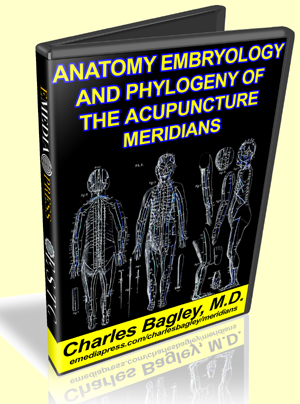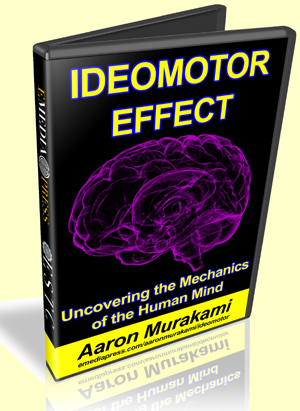Anatomy, Embryology, Phylogeny of the Acupuncture Meridians by Charles Bagley MD

Buckminster Fuller said nature always finds the most efficient structure.
This presentation will outline the underlying geometric structure of the acupuncture meridian system. Energy plays off a structure. This will be more about structure than energy although the Daoist culture that created acupuncture has a lot to say about energy and consciousness. Conventional wisdom has asserted that there is no anatomical basis for acupuncture meridians. They are just some ethereal ancient Chinese “new age” theory.
Get your copy here: Anatomy, Embryology & Phylogeny of the Acupuncture Meridian System by Charles Bagley, M.D.
Get 25% off for a limited time with this coupon: MERIDIANS25
Evidence will be presented to show that not only is there detailed anatomical basis for meridians but the meridian patterns can be traced back at least 500 million years to the origin of vertebrate evolution and possibility beyond vertebrate evolution. The presence of the vertebrate meridian pattern in non-vertebrate animals suggests it may be one of those generic archetypal “efficient structures”.
The key to understanding the meridian pattern is recognizing that it is fundamentally vertical parallel lines which intersect horizontally to form a grid. Vertebrate evolution is also based on establishing a vertical body axis (the spine) which is divided into segments that control the horizontal territories in the body. The acupuncture grid follows this horizontal vertical pattern in the anatomy. While this pattern is genetically programmed by genes highly conserved in evolution, this paper will not address the molecular biology and focus on macroscopic anatomical patterns.
Additional evidence of similar meridian patterns in other non-vertebrate animal groups such as arthropods (insects, crustaceans) raises the question of whether meridians are a more generic archetypal life template. Following the meridians back to their early embryological origins raises another question of whether meridians guide embryo formation or are a result of the formative processes.
Division of the anatomy into Yang (back, head, skin/outside the body, extensor muscles/sympathetic nervous system function and Yin (front, internal organs, flexor muscles/parasympathetic nervous system function) divisions confirms the Daoist philosophy that is the basis of the meridian system.
This presentation is tailored to an audience that is not trained in medical school level anatomy.
Get your copy here: Anatomy, Embryology & Phylogeny of the Acupuncture Meridian System by Charles Bagley, M.D.
Get 25% off for a limited time with this coupon: MERIDIANS25
Anatomy, Embryology & Phylogeny of the Acupuncture Meridian System by Charles Bagley, M.D.

Buckminster Fuller said nature always finds the most efficient structure.
This presentation will outline the underlying geometric structure of the acupuncture meridian system. Energy plays off a structure. This will be more about structure than energy although the Daoist culture that created acupuncture has a lot to say about energy and consciousness. Conventional wisdom has asserted that there is no anatomical basis for acupuncture meridians. They are just some ethereal ancient Chinese “new age” theory.
Get your copy here: Anatomy, Embryology & Phylogeny of the Acupuncture Meridian System by Charles Bagley, M.D.
Get 25% off for a limited time with this coupon: MERIDIANS25
Evidence will be presented to show that not only is there detailed anatomical basis for meridians but the meridian patterns can be traced back at least 500 million years to the origin of vertebrate evolution and possibility beyond vertebrate evolution. The presence of the vertebrate meridian pattern in non-vertebrate animals suggests it may be one of those generic archetypal “efficient structures”.
The key to understanding the meridian pattern is recognizing that it is fundamentally vertical parallel lines which intersect horizontally to form a grid. Vertebrate evolution is also based on establishing a vertical body axis (the spine) which is divided into segments that control the horizontal territories in the body. The acupuncture grid follows this horizontal vertical pattern in the anatomy. While this pattern is genetically programmed by genes highly conserved in evolution, this paper will not address the molecular biology and focus on macroscopic anatomical patterns.
Additional evidence of similar meridian patterns in other non-vertebrate animal groups such as arthropods (insects, crustaceans) raises the question of whether meridians are a more generic archetypal life template. Following the meridians back to their early embryological origins raises another question of whether meridians guide embryo formation or are a result of the formative processes.
Division of the anatomy into Yang (back, head, skin/outside the body, extensor muscles/sympathetic nervous system function and Yin (front, internal organs, flexor muscles/parasympathetic nervous system function) divisions confirms the Daoist philosophy that is the basis of the meridian system.
This presentation is tailored to an audience that is not trained in medical school level anatomy.
Get your copy here: Anatomy, Embryology & Phylogeny of the Acupuncture Meridian System by Charles Bagley, M.D.
Get 25% off for a limited time with this coupon: MERIDIANS25
Anatomy, Embryology & Phylogeny of the Acupuncture Meridian System by Charles Bagley, M.D.





Comment